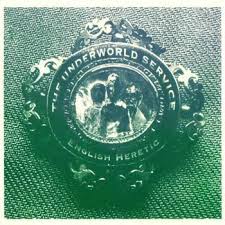Andy Sharp, aka English Heretic, is the latest in a notable line of artists – including David Bowie, Peter Hammill, Mark E Smith and Karl Blake – whose idiosyncratic musical vision is inspired and coloured by an abiding interest in the arcane and the occult. Sharp is also something of a Renaissance Man, additionally producing written works, giving talks and staging performances that further the English Heretic project of unearthing hidden or forgotten cultural oddities, forging psycho-historical/geographical connections, and generally re-mythologising "the blood-drenched battlefields of Albion." In the 1970s, Sharp would have been given his own late night slot on BBC2, just before The Open University programmes, but for our own era, let’s imagine him as a mischievous combination of James Burke, Adam Curtis and Garth Marenghi.
The Underworld Service is his most accomplished and fully realised album yet, "scanning a waveband of Corpse Oriented Rock, Philosophical Stoner, Field Trip Hop, Horror Folk, and Funereal Disco" (Sharp’s own words are far too good not to quote). In practice, we get 70 minutes of music operating at the intersection of post-punk and art rock – which makes Blake’s Shock Headed Peters a particularly good reference point – with Sharp’s invocatory singing often counterpointed or replaced entirely by readings, voiceovers and film dialogue. This gives a disturbing, dream-like feel to much of the album – in fact, one of the framing devices that Sharp uses here is the idea that "the dream belongs to the underworld – a nightly ritual descent to Hades." (Though if that all sounds a bit heavy, there’s a mordant sense of humour at work here too.)
Of course, Sharp isn’t the only artist obsessed with the cultural "terminus of the 1960s, 70s and early 80s" – for instance, both Ghost Box and Trunk Records have mined a similar seam for thematic inspiration and obscure sounds. But rather than just trading in retro-exotica, English Heretic rejects the "tendency to rewire our modular synthesisers to the tune of uncanny children’s TV" and takes a much deeper dive into the mysterious loam of the recent past. Specifically, Sharp "celebrates the hard-hitting documentary format" of shows such as World In Action, where graphic reports on the Vietnam War or Khmer Rouge might follow the cosy certainties of Coronation Street. There’s also a home-made, unburnished quality to the music on The Underworld Service that adds to this vérité feeling.
‘Inside The Mausoleum’ starts with what sounds like digital ghosts weeping into their cups before the soft padding of a bassline and the keening of a synthetic violin tentatively penetrate the sepulchral darkness. As Richard Burton reads from Malcolm Lowry’s Under The Volcano – "the room shaking with demonic orchestras" – the harsh thunk of the programmed drums and massed ranks of e-bowed guitars recall the lumbering majesty of Pink Floyd or perhaps King Crimson divested of all superfluous virtuosity. In contrast, ‘River Of Black Rams’ Blood’ channels the deep space pounding of Hawkwind at their filthiest (there’s even a discordant whining mixed in that could be Nik Turner’s sax), while Sharp wheezes threateningly over the top (by his own assessment, half Alan Vega, half Andrew Eldritch).
Perhaps the spookiest and most moving track on the album is ‘Invisible Canon’. Sharp writes that he wanted to do something in "the style of an apocalyptic DJ Shadow", and he certainly succeeds. Based on field recordings from Hiroshima, he creates an incredible splice between cold wave synthscapes and a soulful but numbed torch song based on words from survivors of the first atomic bomb drop. An eastern flute motif offers scant relief from the freezing atmosphere, and the perky vocal sample telling us about animal skeletons turns out to be sourced from Threads, possibly the bleakest piece of television drama ever transmitted. The effect is mesmerising and utterly chilling.
Elsewhere, there’s an engagement with more traditional music, a version of horrific murder ballad ‘Let Sleeping Corpses Lie’ suggesting a spiritual allegiance with doom metal folksters Crumbling Ghost. This evocation of ancient England continues on ‘Video Anxieties’, with Sharp delivering a bare, unadorned vocal over a bedrock of medieval Mellotron. A flute weaves in and out of the grinding rhythm track like startled wildlife gazing across the moors at some random act of human destruction.
On the home stretch, the sounds seem to get weirder and more abstract, as though we’re finally arriving at that dream chamber at the heart of the underworld. With its heavenly choirs and echoing percussion, ‘Transmutation At Sizewell B’ could almost be an early 90s comedown track, but Sharp’s incantation over the top is his most skewed and unnerving performance yet. But it’s ‘Operation Wandering Soul’ that’s the real stuff of nightmares. Over more creaking Mellotron, John Pilger cynically dissects the unreality of Vietnam – "The war after all is a bore… surely we’ve seen it all on telly" – and uncovers a macabre psychological tactic used by the US army: fabricated voice recordings of dead VietCong soldiers booming out from helicopters to prey on local religious beliefs. The track includes some of these recordings and suffice to say they sound absolutely terrifying.
As with previous English Heretic releases, The Underworld Service comes with a booklet full of Sharp’s fascinating and deliciously discursive musings on the album’s themes (which I’ve only scratched the surface of here), and is worth the price of admission alone. But as it should be, it’s the music that really impresses here and best depicts English Heretic’s strange world of timeslips, alchemy and ritual descents. In short, it’s a triumph.


